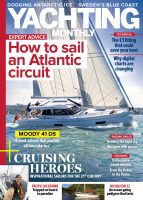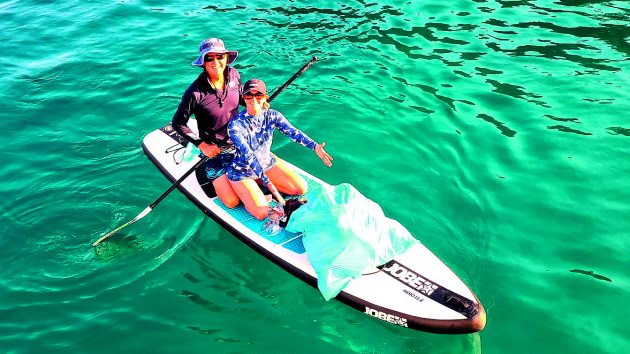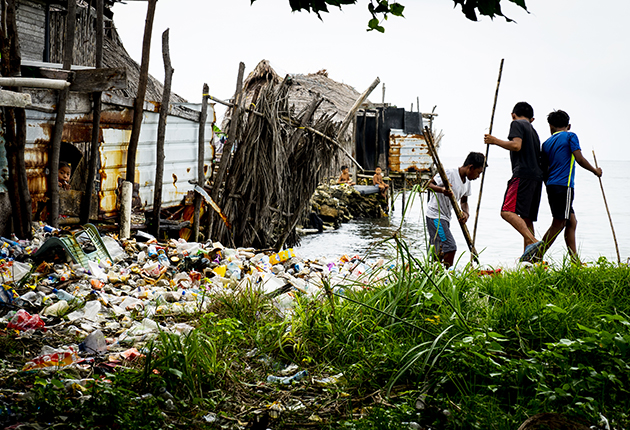Nicholas Hodgson shares how a personal crusade against litter resulted in ‘Trash Tuesdays’, an environmental initiative with ever-growing appeal. The article was runner-up in the 2021 Brian Black Memorial Award for marine environmental journalism
Nicholas Hodgson shares how a personal crusade against litter resulted in ‘Trash Tuesdays’, an environmental initiative with ever-growing appeal. The article was runner-up in the 2021 Brian Black Memorial Award for marine environmental journalism
Homo sapiens have survived to become the dominant species on earth not by spotting the similarities in a landscape, but by taking note of the differences, writes Nicholas Hodgson.
Early man would not have survived on the plains of Africa had he not been able to spot a leopard camouflaged in the grass.
One afternoon during our 2017 sailing season in Greece, we anchored in a beautiful cove near Russian Bay on the island of Poros.
As we sat looking out over the landscape, my eyes were drawn to all the rubbish caught in the rocks.

Nicholas and Catherine spend part of the year exploring the Mediterranean aboard their Fountaine Pajot Saba 50, Lady Roslyn. Credit: Nicholas Hodgson
I was bothered that our view was spoiled and. that such a beautiful cove was marred by human carelessness and indifference. I had spotted my ‘leopard’ and a journey began
that I had never expected to take.
I popped our SUP into the water, took a few big blue bin bags with me and paddled to shore.
Within minutes, I had cleaned up the little cove and filled a couple of the bags with plastic water bottles and bits of white polystyrene, as well as pieces of rope, fishing nets, lids and a plastic flip-flop.
When I returned to Lady Roslyn, our Saba 50 sailing catamaran, I sat down with my wife, Catherine, and discussed how much better the cove looked, how much better I felt about having done something to help the environment and how we should draw attention to the issue of plastic trash washed up on the shores of the areas we were visiting.
As we continued our voyage across the Cyclades that summer, cleaning coves and anchorages as we went, I began posting pictures and blogposts to our Lady Roslyn website and Facebook page, and a very simple idea began to take shape.

Nicholas and Catherine launched Trash Tuesdays to encourage other cruisers to do the same. Credit: Nicholas Hodgson
Clean the plastic trash from the coves and beaches where we are anchored and post images to social media. Encourage other sailors to do the same, so that as a group we are ‘paying it forward’ for one another, and the anchorages we love to visit will be known to be free of trash.
Understand and accept that individually, we will make no lasting positive impact on the marine environment, but collectively only 1,000 sailors picking up one bag of trash and posting about it over a 20-week sailing season would amount to 20,000 bags of plastic trash removed from the marine environment in a season.
This would not be a grand design to clean the oceans of all plastic, but a ‘butterfly effect’ initiative, through which a group of like-minded individuals could make a real impact for themselves, for other sailors and for the environment.
The challenge was, and is, how to promote, encourage, cajole and incentivise sailors and charterers to get involved.
What is clear to me is that around the Mediterranean coast, governments and local authorities do not and will not, in the foreseeable future, have the ability to clean up the coastlines.
If the sailing community wish to continue to enjoy beautiful surroundings, we will have to do something about it ourselves.
It is this challenge that has occupied the last five years of our sailing lives.
Trash Tuesdays launches
We created the Trash Tuesdays Facebook group, where sailors anywhere in the world can post about their clean-ups.
They are encouraged to post on a Tuesday so that ‘trash fatigue’ does not set in. ‘Trash Tuesdays’ has been adopted by the Facebook Med Sailing group, Catamaran Sailing group, Sailing the Lycian Coast of Turkey group and Fountaine Pajot Catamaran group, all of which actively encourage posts.
Collectively, there are currently 38,360 members of these groups.
Our next challenge is to encourage charter companies, marinas and coastal hotels to get involved by promoting plastic trash clean-ups by their charter clients, liveaboards and guests.
It requires some creative thinking using imaginative ways to encourage visitors to an area to pick up trash while they are on holiday.

Friends of Nicholas and Catherine often pitch in to help on Trash Tuesdays. This was their biggest collection in 2019 at Pserimos in the Dodecanese. Credit: Nicholas Hodgson
While sailing along the Kassandra Peninsula in northern Greece in July 2019, we berthed for three nights at the beautiful and luxurious Sani Marina and Resort.
Running northwards from the edge of the resort is beautiful Bousoulas beach, a 4km-long stretch of soft white sand.
On one side is the turquoise water of the Aegean and on the other, the beautiful forest and Sani Wetland, home to more than 200 species of birds, some of which are rare and endangered.
It was such a beautiful day that I decided to go for a run along the beach.
Once you are past the beach bar and umbrellas, which are located at one end of the beach, there is only white sand stretching in front of you as far as the eye can see.
Because the sand at the water’s edge was a bit soft in places, I found myself zigzagging back and forth across the beach, alternating between the water’s edge and the low dunes, looking for firmness underfoot.
That’s when I began noticing plastic bottle caps dotted along my path, scattered like pebbles by Hansel, from the Brothers Grimm fairy tale Hansel and Gretel.
Bottle tops strewn like confetti
At the far end of the beach where I stopped to catch my breath, I turned around and saw a bottle cap at my feet.
I bent down to pick it up and put it in the back pocket of my running shorts, and that moment was the end of my run and the beginning of my ‘quest’.
I started picking up the caps as I walked. Within metres my pocket was full, so I took off my running hat and started filling it with the caps.
I looked up and, knowing that the resort was 4km away, wondered how many caps I could pick up on the return leg.
Very soon my running hat was full and I had nothing else to carry all the caps in, so I took off my running shirt and tied a knot in the arms and neck to make a bag.

The 668 bottle caps picked up along Bousoulas beach. Credit: Nicholas Hodgson
I transferred all the plastic caps into my new ‘bag’ and put my hat back on.
It took me more than two hours to meander back and forth along the beach, and the shirt ‘bag’ kept getting fuller.
By the time I reached the umbrellas at the end of the beach, my back was breaking from bending over and my heart was aching for the planet.
We humans have chosen convenience over our conscience, and huge companies seem to have placed profits before the planet.
When I reached down to pick up my 500th screw-top bottle cap, I put it into the back pocket of my shorts to remind myself that, in my view, big corporates need to be held accountable for this environmental travesty.
Continues below…
Sailing Svalbard: an Arctic education
Sam Shrives contends with sea ice and an amorous walrus during a three-month cruise from Norway across the Barents Sea…
Polluted Paradise: Brian Black Memorial Award winner for 2021
Sophie Dingwall sees firsthand the impact of plastic pollution on the Caribbean's population. Her article - Polluted Paradise - has…
Sailors urged to support Trash Tuesday to help fight against plastic pollution
Cruisers around the world are being urged to join the Trash Tuesday initiative to try and tackle ocean pollution
New Brian Black Memorial Award for marine environmental journalism
Yachting Monthly has launched a new journalism award in memory of Brian and Lesley Black, which aims to recognise the…
With the world facing a diabetes epidemic it is no wonder that drinks companies are branching out and aggressively producing and promoting bottled water.
It is the GIANT elephant in the room. If these firms are forced or persuaded to do something to find solutions to this mess, all the other smaller producers will also fall in line.
It’s no longer good enough to hide behind the mantra that it is ‘the consumer’s responsibility to dispose of the plastic once purchased’.
Of course, consumers must take responsibility for their actions, but it seems to me the planet can no longer stand the promotion of rampant consumerism and convenience without holding
the profit makers to account.

Bousoulas beach on the Kassandra Peninsula of northern Greece is close to the 110-hectare Sani Wetland. Credit: Nicholas Hodgson
So, how many plastic bottle caps did I pick up in the end? 668! Let that number sink in.
One randomly chosen beach in a corner of Greece, with one cap lying on it for every five steps taken. I bent over 668 times to pick up a cap.
That means 668 people chose to throw away a bottle or the cap without thinking, resulting in 668 pieces of plastic that could easily end up in a bird’s stomach.
However, 668 caps are no longer on that beach. I do, at least, take heart from knowing that.
The indicator cove
In July of 2018 we anchored in a very beautiful cove just off Gemiler Adasi, along the Lycian Coast of Turkey.
After anchoring and setting the two stern lines ashore, we could not help but notice all the plastic trash caught in the cove.
Setting off on SUPs, it took four of us well over an hour to collect a number of trash bags full of plastic. Catherine and I returned in July 2021.

Nicholas and Catherine would like cruisers around the world to take part in the Trash Tuesdays initiative. Credit: Nicholas Hodgson
While preparing to anchor, I wondered how we might find this special little cove, which often attracts turtles to its turquoise waters.
I was very pleasantly surprised to find that after three years away it took me 45 minutes to collect only one full bag of plastic trash.
The cove is now once again completely free of plastic rubbish.

Nicholas and Catherine have cruised Lady Roslyn extensively around the Med for the last six years, including Turkey, Croatia, Italy, Montenegro and Greece. Credit: Nicholas Hodgson
While there were the usual culprits of well-known fizzy drinks bottles and caps and multiple empty plastic water bottles, the real concern for me is the huge increase in microplastic scum on the surface of the water.
The white polystyrene fish crates, thin plastic bags and sheet plastic break down easily under the sun’s UV rays.
How to capture those items will be food for thought for me this season.
Sharing the Trash Tuesdays love
Just as the small cove at Gemiler Adasi gives me hope that bays and beaches that are cleaned can remain relatively clear of plastic for an extended period, so is the fact that many of the anchorages we have stopped at during the last six years of cruising in the Mediterranean have been found to be completely clear of plastic trash.

Nicholas and Catherine are originally from Cape Town, South Africa. Wanting to double their summers, they spend part of the year living on their Fountaine Pajot Saba 50 sailing catamaran Lady Roslyn and are currently based in the Mediterranean. Catherine continues to successfully run their companies from the boat. Nicholas has stepped back from the business and is now the self-designated ‘Director of Happiness’. Their motto is: ‘We travel not to escape life, but for life not to escape us.’ Credit: Nicholas Hodgson
This is good news. However, we cannot be complacent.
Yachting is becoming ever more popular and I believe that the shock of COVID-19 has prompted many people to act on their dreams of sailing to distant shores.
It is very easy to become despondent when we see all this rubbish, but I believe that if we all make an effort to clean the anchorages we visit, we make the stay more pleasant for ourselves while paying it forward for others who will visit there after us.
It’s a virtuous circle: what benefits me benefits my fellow man, and benefits the marine environment. Next time you anchor in a beautiful cove see if you can spot the leopard in the grass…
Visit the Trash Tuesdays Facebook page here
Read about the Trash Tuesdays initiative here
Brian Black Memorial Award sponsored by B&G

Brian Black, a television journalist and lifelong sailor and contributor to Yachting Monthly, was as passionate about the marine environment as he was eloquent in his writing and filmmaking about the crises facing fragile Arctic ecosystems.
His wife Lesley was a sailor and author in her own right, becoming Northern Ireland’s first female yacht club commodore.
As a memorial to Brian and Lesley Black, the Black family, in conjunction with YM, established an award to celebrate sailing adventures which shed a fresh light on marine environmental issues through inspiring journalism.
The award aims to recognise the very best writing about the marine environment that brings a new perspective to readers.

The award is sponsored by marine electronics company B&G, which recognises sustainability as one of the pillars of its multi-year strategy.
B&G’s sustainability agenda includes: removing all single- use plastics from its packaging and using only recyclable materials from this year; reducing company air travel by 90%; reducing paper used in their offices by 95%; and decreasing energy consumption for IT equipment from 305,000kWh to 250,000kWh.
It is also working with sister company C-Map to open up their BioBase platform, which processes, maps and stores spatial aquatic data free of charge to government bodies and research institutes, to support aquatic conservation. www.bandg.com
For more details on the Brian Black Memorial Award visit: www.yachtingmonthly.com/brianblack
Enjoyed reading this article?
A subscription to Yachting Monthly magazine costs around 40% less than the cover price.
Print and digital editions are available through Magazines Direct – where you can also find the latest deals.
YM is packed with information to help you get the most from your time on the water.
-
-
- Take your seamanship to the next level with tips, advice and skills from our experts
- Impartial in-depth reviews of the latest yachts and equipment
- Cruising guides to help you reach those dream destinations
-
Follow us on Facebook, Twitter and Instagram.








